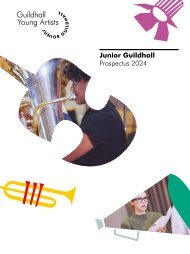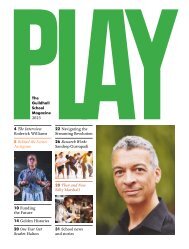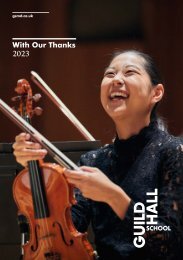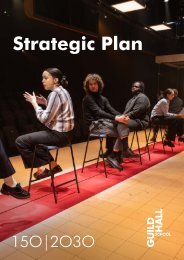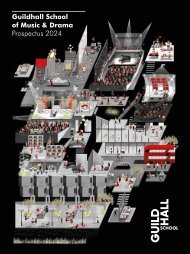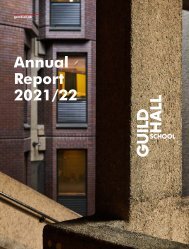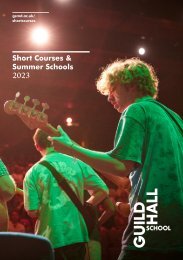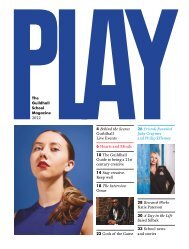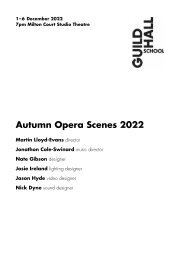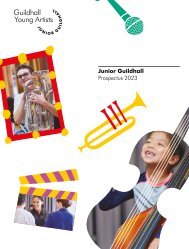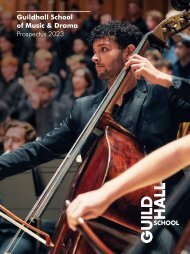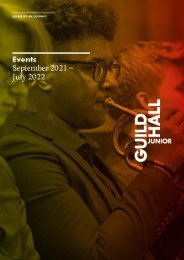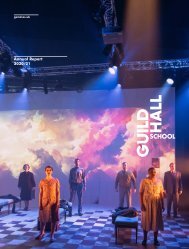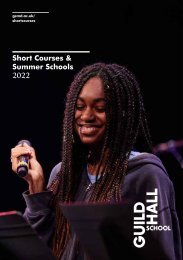Guildhall School - Before you Leave Home Handbook 2020
Everything you need to know before starting your training at Guildhall.
Everything you need to know before starting your training at Guildhall.
- No tags were found...
You also want an ePaper? Increase the reach of your titles
YUMPU automatically turns print PDFs into web optimized ePapers that Google loves.
2020/21
Before You
Leave Home
Handbook
2
3
Checklist
All students
Have you contacted us if you are unsure
of anything or have any problems?
We are here to help! Go to page 72 for
Useful contacts
If you are self-funded, have you paid
your tuition fee deposit? (Deadline:
Wednesday 15 July 2020)
If you are not self-funded, have you
applied for your loan?
If you are expecting a loan, do you have
enough money to cover your tuition
fees and living costs for at least the first
month? (Just in case)
If you are expecting a Guildhall School
maintenance scholarship, have you
entered your UK bank account details
on eGo?
If you do not already have one, have you
researched opening a UK bank account?
Have you arranged your travel to
London and researched how to find
the School?
Have you arranged accommodation
in London?
If you are living in Sundial Court,
have you paid your deposit and signed
your contract?
Have you arranged insurance
(belongings and travel)?
Have you met all of the conditions listed
in your offer letter?
If a DBS check is a condition of your
offer, have you contacted Registry to
make an appointment to go over your
application and documents?
Do you have your original education
certificates (with certified translations)
ready for enrolment?
Have you got an acceptable, valid form
of identification for Enrolment?
Have you completed all of the online
Pre-Enrolment tasks on eGo?
Have you completed all actions listed
in the ‘Actions’ page on eGo? These are
specific to you and all very important.
Have you read your department-specific
information on eGo and MyGuildhall?
Check regularly for updates.
Have you uploaded a photo for your
student ID card? For more info go to
page 15
Have you accessed your School IT
account? For more info go to page 16
Have you made a detailed list of what
you need to pack?
Have you got documentation or
reports you might need relating to
any disability?
Have you looked at the sources listed
in the Further Information section
of this handbook? (page 69)
Have you been in touch with the
Students’ Union or made contact with
your buddy? For more info go to page 44
If you will be travelling to the School
each day, have you applied for the
18+ Student Photocard? (full-time
students only)
Important Dates
Payment deadlines:
Tuition fee deposit
Wednesday 15th July 2020
Tuition fee (1st instalment)
Monday 14 September 2020
Tuition fee (2nd instalment)
Monday 4 January 2021
Tuition fee (3rd instalment)
Monday 19 April 2021
International students
Have you got your passport?
Make sure it is valid.
If you are applying for a Tier 4 visa,
have you requested a CAS?
Has your entry clearance/leave
to remain been granted?
If you have applied for your visa from
outside of the UK, do you know where
you will need to go to collect your
Biometric Residence Permit shortly
after arriving in the country?
Have you checked if you need to register
with the Police at the OVRO shortly
after arrival in the UK?
Have you booked your place at the
International Students’ Orientation on
Friday 18 September 2020 (Deadline to
book is Monday 31 August 2020)
If a DBS check is a condition of your
offer, have you requested a Certificate of
Good Conduct from your home country?
More information on how to apply for a
Certificate of Good Conduct is available
on the Home Office website.
Do you have your CAS, offer letter, a
note of important phone numbers and
addresses in your hand luggage?
International Students: please look
for sections in red, as these contain extra
information which applies specifically
to you!
6
Contents
Introduction
11 Equal opportunities statement
1 Before you
leave home
Preparing to enrol
14 What is eGo?
14 Pre-Enrolment tasks
14 Conditions of your offer
15 eGo Actions
15 Student ID card photo
16 Accessing your IT account
17 What to pack?
Preparing for life at Guildhall School
18 Buddy programmes
19 Get in touch with the Students’ Union
19 Language skills
19 Culture shock
Money
20 Applying for funding
20 Budgeting
20 Expenses when you arrive
21 Opening a bank account
21 Banking advice for non-UK students
Insurance
24 Travel insurance
24 Personal possessions insurance
24 Health insurance
Health & Disability
25 Declaration of Health form
25 What do I do if I have a long-term
medical condition and/or disability?
25 Health, Disability and Learning
Support Services
26 National Health Service (NHS)
26 Information for students who do not
require immigration permission
27 Information for Non-EEA/
Swiss Nationals
27 Registering with a doctor/GP
28 Dental and prescription charges
28 Vaccinations
Immigration information
29 Entering the UK
29 Making a Tier 4 Student application
29 Conditions of entry and attendance
monitoring
30 Work restrictions
30 Seeking advice
2 Arrival
Travelling to Guildhall School
34 Find us
34 Public transport
Travelling to London
35 From Heathrow Airport
35 From Gatwick Airport
35 From Stansted Airport
35 From Luton Airport
Arriving at the UK border
36 Registration with the police
37 Personal safety in London
Accommodation
38 Sundial Court Halls of Residence
7
3 Enrolment and the
start of term
42 What do I do on the first day
of term?
When and where do I enrol?
42 Music students
42 All other students
What do I need to bring with me?
43 Enrolment Day Checklist
44 What happens if I don’t have everything?
What do I do in the first week of term?
44 Programme inductions
44 Handbooks and policies
45 Student Affairs Welcome Desk
45 Freshers’ Fair
45 International Students’ Orientation
How do I prove I’m a student once
I’ve enrolled?
46 Student ID card
46 How do I get a student discount
for travel?
4 Fees and funding
Tuition fees
50 If you have a UK undergraduate tuition
fee loan
50 If you have a Guildhall School
scholarship
50 If you (or relatives/friends are paying
your tuition fees)
51 Tuition fee instalment plan
Maintenance (living costs)
52 If you are expecting a student
maintenance loan (UK undergraduate
students only)
52 If you are expecting a postgraduate loan
52 If you are expecting a Scholarship for
maintenance from Guildhall School
5 Life at the
Guildhall School
57 Student Charter
62 Student Handbook
62 Student Support
Student Communication
63 Email & MyGuildhall
63 Student News
63 Student smart phone ‘app’
63 Information sessions and workshops
63 Money Management Advice
Getting involved
64 Enjoy the Students’ Union Freshers’
Week activities
64 Join a student club or society
64 Volunteer to help organise special events
64 Sustainability
On-line learning
65 Induction
65 Equipment
8
6 Further
information
69 Useful Links
7 Useful contacts for
the summer period
72 Music
72 Acting, Production Arts
and Creative Learning
72 Research
72 Enquiries regarding enrolment,
fees, visas and student funding
73 Enquiries regarding accommodation,
health, disability and student life
73 Sundial Court
73 Students’ Union
9
Introduction
We look forward to welcoming you to Guildhall
School of Music & Drama.
Before you arrive, there are many things you need
to think about and prepare so that you can make
the most of your time here.
This Before You Leave Home Handbook highlights
the things you need to organise before you arrive.
We hope that you will find all the information you
need to ensure you enjoy your first few days at the
School and in London.
You will receive many more helpful tools upon
your arrival to help you adapt to life in a new
environment. The information in this handbook
is for all students joining a new programme.
We are pleased that you will be studying here
and we look forward to meeting you!
Stuart Brooking
Assistant Registrar (Admissions & Enrolment)
Julia Oliver
Student Life Officer
10
Equal Opportunities Statement
Guildhall School of Music & Drama
is a department of the City of London
Corporation and has a comprehensive
equal opportunities policy to which
the School is fully committed. Its aim
is to ensure that everyone receives fair
treatment regardless of:
• age
• disability
• sex
• gender reassignment
• marriage and civil partnership
• pregnancy and maternity
• sexual orientation
• race
• religion and beliefs
More Information
To find out more about what every student
can expect whilst at Guildhall School,
please go to Section 5: Life at Guildhall
School where you will find the Student
Charter.
To read more about the School’s
commitment to equality and diversity,
please visit the website.
Student Affairs
Telephone +44 (0)20 7382 7219
student.affairs@gsmd.ac.uk
The School is committed to fostering
an environment for students and staff
free from discrimination, prejudice and
harassment and to pursuing equality of
opportunity in the delivery of its services
and facilities.
11
12
Before you leave home
There are many things to think about before
you arrive at the School. We’ve tried to provide
you with information in this handbook to help
you prepare. Start as early as possible and do
ask for assistance if you need help.
Guildhall School website and eGo portal
will provide you with lots of useful information.
13
Preparing to enrol
Registry Team
Telephone +44 (0)20 7382 7181
registry@gsmd.ac.uk
– signing up to the Terms of Enrolment
– paying fees in advance
– filling in the Declaration of Health Form
What is eGo?
eGo stands for electronic Guildhall
operations. It is a portal that enables you
to view and update the live information
the School holds about you on its student
records system. You are probably already
familiar with the eGo Applications page, as
it is here you would have seen details of your
audition/ interview and accepted your offer.
You will now have access to the Student
pages: Home, Absence, and Enrolment. Fees &
Funding pages will become available when
Pre-Enrolment opens.
eGo also allows you to perform some tasks
online such as:
– requesting letters that confirm your
student status (Home page)
– updating your personal and contact
details (Home page)
– requesting approval for a leave of absence
(Absence page)
– paying for tuition fees, or making an
ad hoc payment (i.e. for a lost ID card)
(Fees & Funding page)
– completing Pre-Enrolment tasks
(Enrolment page)
Pre-Enrolment tasks
Before completing full enrolment, you
will be required to complete some ‘Pre-
Enrolment’ tasks on the eGo Enrolment page:
– confirming personal and contact details
14
Important note
The purpose of enrolment is to register
formally with Guildhall School, which
in turn defines your student status and
associated rights and responsibilities.
Your online enrolment confirms your
acceptance to abide by the School’s
Student Code of Conduct (Academic
Regulatory Framework, section 5) and
other policies. If you are under 18, you
will need to get the permission of your
parent/guardian to agree to the Terms
of Enrolment. The School’s contract
with you is explained in detail on the
website.
Conditions of your offer
The conditions of your offer and the
deadlines by which you must meet them
are listed in your official offer letter. Some
condition deadlines are listed as Monday
14 September 2020 – that means you do
not need to fulfil this condition until
Enrolment.
Some conditions require a lot of preparation,
for example:
– requesting a replacement certificate or
official transcript if you have lost your
qualification certificate(s)
– if your qualifications were not
undertaken in the UK, arranging to have
your documents translated into English by
a certified translator
– if you are a non-UK student with a DBS
check condition, requesting a Certificate
of Good Character from the authorities in
your home country
If you have not met all of the conditions
of your offer by Enrolment, you will not be
able to fully enrol. For more information,
please see ‘What happens if I don’t have
everything?’ on page 44.
If you are unsure of the conditions of your
offer, please contact your Admissions
Coordinator. Their direct contact details are on
your offer letter, on eGo Applications and in
the Useful Contacts section of this handbook.
Can I get an unconditional offer letter?
It is strongly recommended that new
students wait until Enrolment in September
to bring their original qualification
certificates or transcripts for verification.
However, if you wish to obtain an
unconditional offer letter before this (and
you have met all other conditions of your
offer), you will need to provide certified
copies of your qualifications.
It is worth bearing in mind that most banks
and organisations will only accept proof of
enrolment letters when opening student
accounts. You will receive a confirmation of
enrolment letter once you have fully enrolled
so an unconditional offer letter might not
benefit you if you need it for this purpose. If
you have any questions, please contact Registry.
Even if you have an unconditional offer, you
will still need to complete an identification
process either online or if this is not possible,
in person.
eGo Actions
The Actions page on eGo is very important.
It can be found on eGo > Applications > More
Details > Actions
It has a list of actions that are tailored to
you. Actions include (but are not limited to):
– choosing electives (Music students only)
– uploading your ID photo
– paying your tuition fees/tuition fee deposit
– requesting a CAS
– applying for a DBS check
– and more…
Student ID card photo
Even if you have previously been enrolled
on a Guildhall School programme, you must
upload a suitable photo of yourself on eGo
Applications by Friday 21 August 2020. Your
photo must be passport style:
– in colour
– taken against a plain, light background
– taken within the last 6 months
– clear and in focus
– unaltered by computer software
(including filters)
- a close up of your head & shoulders facing
forward, with no other people/objects
in view.
15
You must save your photo as a .jpg file with
a file size between 500 KB and 1 MB before
uploading it.
If you have not uploaded your photo by
this date or if it not in an acceptable format,
you may face a considerable wait for your
ID card.
Accessing your IT account
You will be emailed when your Guildhall
School IT account is ready. As soon as you
receive this notification, you must log in to
eGo and click the Account heading to access
your new account login details. Make a
note of them – you should use these new IT
account details to access eGo.
Important note
Accessing your new account for the first
time must be done remotely, so please
ensure you log in before you arrive at
the School, otherwise you will not be
able to access the School IT services.
16
What to pack
You will no doubt have lots of things you want
to bring with you, and we suggest you start to
write a list to ensure you don’t forget anything
useful. We’ve listed some items to start you off.
Items for identification
You will often need to produce identification.
This will be for many reasons, including
opening bank accounts. Below is a list of
frequently requested forms of identification
- Passport
– UK Driving Licence
– Offer letter from Guildhall School
– Passport
– NUS ID card (if already a student)
– National Insurance Number card
– Visa or Biometric Residence Permit and
decision letter from Home Office (if
applicable)
– National ID card (if applicable)
– Recent non-UK bank statement
Additional items for Enrolment
– Original qualification certificates or
academic transcripts (and accompanying
certified translation into English) or digital
certified copies.
– English Language certificate such as IELTS
or TOEFL
– Documents related to any other condition
of your offer
– Confirmation of funding (from Guildhall
School, Student Finance, EU Team, etc.)
– NHS number and current GP name and
address (UK students)
Other important items
– Debit/credit cards, cheque book
– Approximately £1,200 worth of traveller’s
cheques or funds in a bank account and
some cash
– Specific equipment/clothes for your
programme of study. Please note,
BA Production Arts students will receive
detailed equipment lists, and
BA & MA Acting students will receive a
clothing and book list.
– Suitable IT equipment to access on-line
learning (see section 5)
– Medical prescription information
– Photocopies of all important documents
(e.g. passport) kept separately
– Tenancy agreement or Student
Accommodation contract
Items for your accommodation
It is important that students who have been
offered a place at Sundial Court carefully
read through the Sundial Court A-Z
(available on eGo > Sundial Court page) as
this provides information about what is,
and what is not, provided. It includes sample
inventories that list items that are provided
in the bedrooms and communal areas of flats.
If you are not living in Sundial Court,
you should check with your landlord or
accommodation provider what will be
included in the inventory. You can also refer
to online resources like these for useful ideas
on what to bring with you:
– Save the Student
– Student Room
17
Preparing for life at Guildhall School
Leaving home and moving to university
can be an exciting but also daunting time
for many students. Our Student Affairs
team is available to offer support and can
be reached on:
Student Affairs
student.affairs@gsmd.ac.uk
There are also a number of resources to
provide general advice and tips for students:
– The National Union of Students (NUS)
has a range of articles on topics like
studying, revision, budgeting and looking
for part-time work
– The Student Room has wide-ranging
advice and tips on student success,
including dedicated advice on health and
relationships. It also has a ‘Learn Together’
study skills section which includes
downloadable tools such as study planners.
The Student Room houses very active
forums and lots of peer-to-peer advice.
– The advice from Save the Student
emphasises money issues, including lots
of money-saving and making tips, as well
as downloadable guides.
– Prepare for Success is an interactive web
learning tool for international students
who are getting ready to come to the UK.
Don’t miss out on this great resource!
– Prepare by finding out as much as you can
about the United Kingdom and London.
Why not purchase a travel guide to the UK?
Buddy programmes
If you are in one of the following categories,
you will be put in touch with a ‘buddy’ at
the School before you arrive. Buddies are
current students who volunteer to make
contact with new students in order to
answer any questions they may have with
regard to the programme, the School or
student life in London. You will be able to
see the contact details and/or a message
from your buddy on eGo > Applications
over the summer – do get in touch with
them – this can be a great way to find out
more about what’s to come.
International students
New international students are assigned a
buddy, sometimes from the same country. The
scheme aims to provide international students
with more information about the different
aspects of living and studying in London.
BA Production Arts students
BA Video Design for Live Performance
students
BA and MA Acting students
BA Acting Studies students
New students are assigned a buddy who is
a current student on the programme. Your
buddy’s contact details will be available
on your eGo portal over the summer. We
encourage you to contact them.
BMus students directly entering
Year 2 or 3
Students who are entering directly into
years 2 or 3 of the Bachelor of Music
18
programme are assigned a buddy who is
usually a current student in the same year
of study as the new student.
Get in touch with the Students’ Union
The Students’ Union will be providing
you with information about its plans
for Freshers’ week and how you can get
involved in its activities.
You can find out information about the
Union on its Facebook profile here.
You can post questions and comments
before you arrive in London and find out
about life at the School. This is a great way
to meet and chat with other students and
you can start to make friends before
you arrive.
Language skills
Studying in London is a great way of
improving your English, but don’t wait
until you get here to start working on it.
Try meeting English-speaking people
in your home country before you leave,
watch films in English and read English
newspapers and magazines. Think about
relevant words you’ll need to use such
as musical or technical terms on your
programme, accommodation terms when
searching for a flat, and work-related terms
when searching for a job. If you want to
improve your language skills, why not
take a preparation course in English? The
British Council offers advice on how to find
language courses in your home country.
Culture shock
Living in a new country and in a new
culture can be a stressful experience at
first. There will be a period of adjustment,
and you might be surprised at how this
change of environment affects you. The
UK Council for International Student
Affairs (UKCISA) provides some very useful
information about what can cause culture
shock and how to handle the effects.
19
Money
Applying for funding
Information about funding was enclosed
with your offer letter and is also available
on our website. You should hopefully have
already applied for funding or sponsorship
and have funds secured to cover your tuition
fees and ‘maintenance’ (living costs), but if
you have any questions, please contact our
Student Funding Officer:
Student Funding Officer
Telephone +44 (0)20 7382 7181
studentfundingofficer@gsmd.ac.uk
Please also see the Fees & Funding section
on page 48.
Budgeting
Budgeting is an essential skill for students
and there are many online tools and tips
to make this easier. If you manage your
finances appropriately, we estimate that
you will need at least £1,200 per month for
maintenance.
To help you plan and manage your money,
use online resources such as:
– the Costs of Living Guide on eGo >
Applications > More Details > General
Information page
– the Money Mentors Budget Planner
on eGo > Applications > More Details >
General Information page
– the National Students’ Union
– the Money Advice Service
– the Student Budgeting tips from UCAS
– Which? Student Budget Calculator
– the Ultimate Student Budget Planner
When budgeting, make sure you think
about costs such as:
– course costs – this includes items like
instruments, books, special clothing and
equipment, stationery and photocopying
– maintenance or living costs – this
includes rent, food, household goods,
insurance, and personal items such as
clothes, travel and leisure activities (such
as sports and nights out)
Living in London is more expensive than
in other UK cities but you may be able to
save money in the wide variety of facilities
available. For example, many local markets are
cheaper than the big supermarkets. Plus, the
benefit of living in such a big cultural city is
that there are lots of things to do for free! Try
Time Out’s Free London guide for getting
the most out of London whilst on a budget.
Expenses when you arrive
Make sure you have enough money before
you arrive in London to live for at least one
month (even if you are expecting a grant or
loan, since these can occasionally take some
weeks to arrive). Please note that Guildhall
School maintenance scholarships and
UK maintenance loans/grants will not be
available for 1–2 weeks after you fully enrol.
There are no immediate or automatic funds
available to students so you must be sure you
can cover the cost of this period yourself.
If you are funding yourself, you should also
20
ensure you have enough money in your bank
account to pay for your tuition fees.
Additionally, public transport, taxis, food
and drinks are all expenses that can quickly
add up. Bring some cash (GBP – pounds
sterling) with you to cover any costs on your
journey. We suggest that you bring £150–
£300 with you for this. Please be vigilant
and keep your wallet or purse in a safe place.
Opening a bank account
All students will need a UK bank account
before or shortly after they arrive in
London. This will allow you to pay fees,
receive loans, grants or bursaries by BACS
or electronic transfer.
– Most high street banks have branches
within a five minute walk from the School.
– Check that the account offers a basic debit
card, and don’t forget to look carefully at
the fine print on overdraft rates and bank
charges.
– Most banks offer a special student account
which may include benefits such as
interest-free overdrafts or incentives like
free travel cards or cinema passes. You
can sometimes open a student account
with your offer letter but some banks will
require a special letter addressed to them.
You can request this on eGo once you are
fully enrolled.
– If you require an unconditional offer
letter to open a bank account prior to
enrolling, you will need to have met all
conditions of your offer first (including
providing original education certificates).
Please see page 15 or contact Registry.
Banking advice for non-UK students
It can be more complicated for non-UK
students to open a bank account.
– Please be aware that most shops and
restaurants use ‘Chip and PIN’ and
‘Contactless’ card payment systems.
– Ask your bank if they can issue you a
bank card or credit card with a chip, so
that you can use this in the UK while
you wait for your UK bank account to be
set up. This is not essential, but it would
make payments faster and easier.
– Make sure you have an open bank account
in your home country and bring the
details of that bank account with you:
· account number
· sort code
· address of your branch head office
This information should be on your bank
statements. If not, please contact your
bank, and ask for this information.
– You will need your passport, proof of
London address (e.g. tenancy agreement),
your current bank details, and a letter
from Guildhall School addressed to the
bank you wish to open an account with.
Once you have fully enrolled, you can
request this letter on eGo.
– The UK bank may need to contact your
bank in your home country, so it can
take a few weeks for your bank account
to be opened.
– Try to avoid carrying large amounts of
cash with you. Traveller’s cheques can
be a safer way to have access to cash for
your first few weeks in London. Check
with your bank in your home country
21
to see if a cash card from home can be
used to withdraw money from UK bank
machines, but be aware there may be an
additional charge for this facility.
It is important for international students
to know that it is considered safe to
deposit funds into a UK bank or building
society account. The Financial Services
Compensation Scheme (FSCS) covers all such
deposits up to a maximum of £85,000 per
person per banking institution in the event
that the institution goes into administration.
In the event that you wish to deposit more
than £85,000, you should seek further
financial advice. We advise all students to
open a bank account in the UK shortly after
their arrival in London. In the UK, large
sums of cash must be kept in a bank account
and never in your bedroom or flat.
Students who are not ordinarily resident in
the UK may be able to reclaim tax deducted
from their interest - download the form
from the Government Website.
22
23
Insurance
Travel insurance
It is advisable to take out travel insurance to
cover your luggage and belongings especially
during transit to the UK. Arrange this in
your home country before you travel.
Personal possessions insurance
We strongly recommend that you take out
personal insurance to cover yourself against
theft, loss or damage to your personal
belongings. There are many insurance
companies in the UK; the National Union
of Students recommends Endsleigh
Insurance. You can also use comparison
websites such as: Money Supermarket and
Compare the Market.
Some students also take out specific insurance
on their musical instruments with insurance
companies such as Allianz Insurance.
Health insurance
Please see the National Health Service (NHS)
section on page 26.
24
Health, Disability and
Learning Support Services
Student Affairs Team
Telephone +44 (0)20 7382 7219
student.affairs@gsmd.ac.uk
Declaration of Health form
The Declaration of Health form must be filled
in as part of the Pre-Enrolment tasks on eGo
> Enrolment. This is to ensure that we offer
you relevant support if you have any medical
conditions. This information is received under
strict confidentiality by our Senior Health
and Welfare Advisor (Registered Nurse) and
does not affect your position at Guildhall.
What do I do if I have a long-term
medical condition and/or disability?
Please ensure any information about a
long-term medical condition or disability
that may affect your studies is disclosed to
both the Senior Health and Welfare Advisor
and the Learning Support and Disability
Coordinator by contacting Student Affairs.
This is to ensure we can support you during
your studies in the most appropriate way
and to enable us to guide you as you prepare
to come to the School.
UK students may be eligible for Disabled
Students Allowance (DSA), but you will
need to be formally assessed to receive this
funding. You should get in touch with
Student Affairs as soon as possible after
accepting your place to study, to obtain advice
on applying for DSA. Otherwise it may
not be available in your first term of study.
Student Affairs will also contact all students
who disclose information about a longterm
medical condition and/or disability
before the start of term so that they can
understand each student’s specific needs and
provide individual advice. Early disclosure
assists students and academic staff to prepare
optimally and means that in many cases
appropriate support and adjustments can be
organised in advance.
You can obtain further information from
your local DSA funding body here:
– England
– Northern Ireland
– Scotland
– Wales
You may also wish to look up the following
helpful guides for prospective students:
– Disability Rights UK information on
Disabled Students’ Allowances (DSA’s)
– Into HE 2020 A guide to additional
support in higher education (Disability
Rights UK)
– Advice for International Students
Learning Support and Disability Services
The Learning Support & Disability
Coordinator deals with all aspects of
disability and learning support. They are
based in Student Affairs at Sundial Court,
and can offer advice on funding and other
practical issues for students who declare
a disability and/or long-term medical
condition or for those who think they
may have a disability. This includes mental
illness, long-term physical health conditions,
neurodiversities (such as Dyslexia,
Dyspraxia, ADHD and Autism), and sensory
impairments.
25
We have specialist tutors available who
provide Study and Practice support to
assist students with both the academic and
practical aspects of their learning. We also
have Counsellors and Specialist Mentors
available to support students.
Please note that support for English as
a foreign language is provided by the
Academic Departments.
If you are neurodiverse (Dyslexia,
Dyspraxia, ADHD, Autistic Spectrum
Condition) etc please contact us so we
can advise you accessing on support and
applying for Disabled Students Allowance
(DSA). We can then have the appropriate
support in place for when your studies
commence. The sooner you do this, the more
likely it will be that support can be set up
for you before your course begins. Please
contact us if you require advice on this.
For all other disabilities and
long-term health conditions, you will
need medical evidence or a report from a
suitably qualified specialist to support your
funding application. Please bring copies of
your assessment report and DSA /funding
correspondence with you at the start of term.
We would encourage you to contact Student
Affairs as early as possible prior to starting
your course, so we can offer you an informal
discussion regarding your needs and your
studies at Guildhall School.
Health and Welfare Advice Service
The Senior Health and Welfare Advisor
who is a Qualified Nurse can offer
advice, guidance, support and assist with
navigating around The NHS for all health
and welfare issues, including physical,
mental and emotional health. Based in
Sundial Court, this service runs confidential
well being clinics, monthly sexual health
clinics and mindful based practices
such as yoga. The Health and Welfare
Advisor works closely with our in-house
physiotherapist and external practitioners to
ensure and promote a holistic approach to
health sustainability.
National Health Service (NHS)
Information for students who do not
require immigration permission
Free medical treatment via the UK National
Health Service (NHS) is available to full-time
students studying in the UK on programmes
lasting at least six months. There is no fee to
use the NHS doctor service, but students aged
over 19 have to pay for certain services;
however, students can apply to the Low
Income Scheme, using the online HC1
form, to see if they qualify for help. Visit
the NHS website for more information and
to see the eligibility.
If you are an EEA or Swiss National on
a programme lasting less than six months,
you need to fill out the relevant paperwork
in your country of residence to ensure your
treatment is covered.
26
Please bring a record of prescriptions for
medication, glasses and/or contact lenses
with you.
EU students should ensure they have
a European Health Insurance Card.
Information about this is available from
the European Commission.
Information for Non-EEA/Swiss
Nationals
If you need to make an immigration
application in order to study in the UK,
you may need to pay a healthcare surcharge
(called the ‘immigration health surcharge’)
as part of the application process. There are
some exemptions to the charge, so to find out
whether you need to pay what it will cost,
please see the IHS overview.
As a guide, you (and your dependents) can
expect to pay approximately £400 per year as
a Tier 4 student.
You will be given an IHS reference number
which you will need to include in your
immigration application. You will then
be able to use the National Health Service
(NHS) but please note that certain types
of services are not free, e.g. prescriptions,
dental treatment and eye tests.
Registering with a doctor/GP
When you arrive in London, you will
need to register with a doctor located in
close proximity to your residence. When
registering with a doctor, you will need to
show some photographic ID and formal
proof of address. You must also make a note
of your GP’s name and address as you will
need to give this information to the School
(in case of an emergency).
All full-time students studying in the UK
on programmes lasting at least six months
are entitled to medical treatment via the
National Health Service (NHS) including
appointments with NHS doctors.
– Students who have accommodation in
Sundial Court Halls of Residence must
register with the Neaman Practice. If
you are a UK resident, you must have your
NHS number to register.
– If you do not live in Sundial Court, you can
obtain a list of GP practices in your area by
going online to the NHS Choices website
and entering the postcode of your UK
residential address. Telephone one of the
GP practices listed and inform the practice
that you need to register with a doctor.
If you are registered for a programme that
lasts less than six months, you must make
sure you take out adequate medical insurance
before leaving your home country.
27
Dental and prescription charges
As a full-time student, you may be entitled
to a reduction in price for dental treatment
and prescription charges. To take advantage
of this, you need to complete the online HC1
form. The Senior Health & Welfare Advisor
can also advise you of NHS prescription and
dental charges.
You can contact Student Affairs on
+44 (0) 20 7382 7219 for further
information.
It is advised that you bring an adequate
supply of your regular medication with
you, as well as copies of any prescriptions
you may have as it can take a long time to
register with a doctor and organise new
prescriptions.
If you have any long-term health conditions
for which you may need to see a specialist in
London, please bring as much information
as possible (for example, regarding
appointments and treatments) so that this
can be passed to the doctor who will be in
charge of your care.
Vaccinations
It is highly recommended that you have
some vaccinations before you arrive; this
is indicated in the Declaration of Health
form. If you are unable to obtain screening
vaccinations in your home country, the
doctor with whom you register in London
can administer the vaccinations.
New university students aged 19-25 are
28
strongly advised to get the Men ACWY
vaccination to protect against strains of
meningitis. You can get the vaccination at
your local GP surgery. More information
and advice on protecting yourself against
meningitis whilst at university is available
from Meningitis Now.
There have been nationwide outbreaks of
Mumps and Measles, as a number of young
adults are not protected against this disease.
The vaccination (MMR) can be obtained
through your General Practitioner or
doctor. If you have a record that you have
had two mumps vaccinations, you do not
need further injections. If you have had one
or no MMR vaccinations then it would be
a good idea to get this vaccination before
you start your studies at the School, either
in your home country or through your new
doctor in London.
Due to the increase of Tuberculosis (TB) in
the UK in recent years, it is important that
all students are screened for TB antibodies
and where appropriate have the subsequent
vaccination (BCG).
Some visa applicants may be required to take
a Tuberculosis (TB) test as part of the visa
application process. To find out if this applies
to you, please see the gov.uk website.
Immigration Information
Entering the UK
If you are a national of the EEA or
Switzerland, you do not need to obtain
‘entry clearance’ before arriving in the
UK. This means you will not need a visa.
However, you may be asked to show
evidence that you have been accepted onto a
programme of study (your offer letter) and
you will need your passport or identity card.
If you are not a national of the EEA or
Switzerland, you will need to ensure you have
the proper immigration permission to study
in the UK. Most international students need to
apply for the Tier 4 (General) Student visa.
The following information is only a general
guide, and we strongly recommend all non-
UK students to read the following guidance:
– the Tier 4 guidance documents on
eGo > Applications > More Details > Actions
page
– UK Visas & Immigration: UKVI
– UK Council for International Student
Affairs: UKCISA
Making a Tier 4 Student application
If you have not already made contact with
the Visa Coordinator, please do so as soon as
you have read through the Tier 4 guidance
documents on eGo:
– Tier 4: A Guide for Students – 2020/21
– Tier 4 CAS Request Form
– Applying from Outside the UK
(Entry Clearance): Guide to the Online
Tier 4 Application Form
– Applying from Within the UK
(Leave to Remain): Guide to the Online
Tier 4 Application Form
Conditions of entry and attendance
monitoring
On a Tier 4 (General) student visa you
are eligible to stay in the country for the
duration of your visa provided you remain
a student at Guildhall School. If you stop
attending your programme for more than
a short period of time, for any reason, you
must return to your home country or apply
for a new type of visa to remain in the UK.
Guildhall School operates an electronic
swipe-in attendance monitoring system
for all students. In addition to swiping in
regularly, Tier 4 students must:
– provide an electronic copy of your Tier
4 BRP to confirm no changes to your
immigration permissions
– keep an Academic Contact Log (taught
postgraduate Music students only), which
will be given to you at Enrolment; you must
keep it safe and regularly have it signed
29
– read, understand and sign a Tier 4
Enrolment Declaration at Enrolment
– engage with any other attendance
monitoring activities introduced during
the year
The School will have to notify the Home
Office of any students with a Tier 4 visa
who do not enrol within 10 days of the start
of each term, or who leave the programme.
Work restrictions
Unless your visa has a work prohibition,
you can work part-time for up to 20 hours
a week during term-time and may work
full- time during holiday periods; however
you must always be able to satisfy the
demands of your programme. BA Acting
students in particular are requested not to
work during term-time.
If you have a Tier 4 student visa, you:
– must not fill a full-time permanent
vacancy
– must not be a self-employed or
freelance worker
– must not undertake work as an
‘entertainer’ (whether paid or unpaid)
– must not engage in ‘business activity’
If you have previously held another type
of visa and have worked as an entertainer
professionally in the UK, these regulations
will apply once you hold a Tier 4 student
visa and this work must cease.
Some Tier 4 student visa holders may
be eligible to undertake employment in
professional performances subject to control
by the School’s Outside Engagement service;
full details and Professional Performance
Guidance are available from the
Music Office.
Tier 4 doctoral students
Except in identifying the start of each new
academic year, term dates do not apply
to the doctoral programme. Therefore,
for Doctoral students on a Tier 4 visa,
any employment (paid or unpaid) is
limited to 20 hours a week except in
those weeks where annual leave has been
officially booked via eGo and approved
by the Programme Leader in advance (on
enrolment you will be given a Tier 4 Visa
Student Handbook as a point of reference).
A maximum of 7 weeks of annual leave per
academic year is permitted.
Seeking advice
Immigration@gsmd.ac.uk will be happy to
help with any queries.
UKCISA also have a student advice line
(Monday to Friday 1pm-4pm, UK time):
Outside the UK +44 20 7788 9214
Inside the UK 020 7788 9214
30
31
32
Arrival
We would like to make your arrival here as easy
and enjoyable as possible. Many of you will be
arriving the weekend before start of term on
Monday 14 September. This means that you will
have time to settle in and participate in some
of the social events organised by the Students’
Union and Student Affairs.
33
Travelling to Guildhall School
Find us
Guildhall School would like to encourage
all visitors to choose the most efficient and
environmentally-friendly travel options
where possible. How to find us.
Free tube, bus and train maps are available
at most stations. You might find it useful to
purchase a ‘London A–Z’ map. Alternatively,
you can plan your route using:
– Citymapper
– Google maps
– Streetmap
Public Transport
If you are going to be using public transport,
check the Transport for London website for
information about different ticket types and
payment methods. Please note:
– cash payments are no longer accepted
on buses
– it is always cheaper to use an oystercard/
contactless to ‘pay as you go’ than to
pay with cash. You can also get further
discounted travel with an 18+ Student
Oyster photo card, saving you 30% on
adult rate travel cards and season tickets.
To check your eligibility and how to apply
visit the Transport for London website.
The closest London Underground (‘tube’)
stations to Guildhall School are:
Moorgate, which is on the Bank branch of
the Northern Line, and the Metropolitan,
Circle, and Hammersmith & City lines.
– At Moorgate, get out at any exit and
follow signs for Guildhall School of
Music & Drama. The School and Sundial
Court are a 5 minute walk from the
station. Map.
Barbican, which is on the Metropolitan,
Circle, and Hammersmith & City lines.
– At Barbican, exit the station, cross the street
and walk down Beech Street (tunnel)
– At the end of the tunnel, turn right on
Silk Street for Guildhall School, or keep
straight on Chiswell Street for Sundial
Court (on the left). Map.
34
Travelling to London
From Heathrow Airport to Central London
From Heathrow Airport, you can travel
to central London by:
– the Heathrow Express – the fastest option
– the Piccadilly line on the London
Underground (‘tube’) – the cheapest option
– or by bus/ coach
From Gatwick Airport to Central London
From Gatwick Airport, you can travel to
central London by:
– Southern trains (to Victoria) and
Thameslink trains (to Farringdon); these
are cheaper, and do not take
that much longer
– the coach or easyBus into Central London
If you are travelling into central London
from Heathrow or Gatwick by train, you
can complete your journey by taking the
underground to Moorgate. Note: there are
two branches to the Northern Line, and
Moorgate is on the Bank branch, not the
Charing Cross branch.
From Luton Airport to Central London
From Luton Airport, you can travel by
Thameslink trains to Farringdon or
by easyBus to Baker Street.
If you are arriving at Farringdon from
Luton, you can walk to the School in
approx. 15 minutes. Exit the station onto
Cowcross Street and head east (towards a
large pub on the corner, called The Castle).
Continue along Cowcross Street until
you reach Charterhouse Street. Turn left
onto Charterhouse Street and walk along
here until you reach the end of the road.
Turn right onto Aldersgate. You have now
reached the Barbican underground station
(map). Alternatively, you could get the
underground from Farringdon to Barbican.
From Stansted Airport to Central London
From Stansted Airport, you can travel to
Liverpool Street via the Stansted Express
or by coach.
If you are arriving at Liverpool Street
from Stansted, you can walk to the School
in approx. 10 minutes. Map.
35
Arriving at the UK border
Keep information about your course in
your hand luggage. This must be a paper
copy (not an electronic copy on a tablet or
phone). This includes your Confirmation
of Acceptance for Studies (CAS) number
and your offer letter. Make sure you also
have your UK address and important phone
numbers to hand.
Expect Border Force officers to ask simple
questions about your stay in the UK when
you arrive at passport control.
The UK Border Force has produced a
‘10 Top Tips’ information leaflet providing
guidance on getting through the UK
border controls as efficiently as possible.
In addition to the information outlined in
this leaflet, you are advised to carry your
visa application decision letter in your
hand-luggage. The decision letter will have
been issued to you to confirm your visa
application was successful.
If you have any trouble at the border,
please contact:
Immigration team
Telephone +44 (0)20 7382 7183
Registry@gsmd.ac.uk
UKCISA Student Advice Line
Outside the UK +44 20 7788 9214
Inside the UK 020 7788 9214
Registration with the police
Some visa holders are required to register
with the police within seven days of arrival.
If it is necessary to do this, the requirement
will either be written on your visa, or you
will receive written confirmation from
the Home Office. A fee (currently £34) is
charged for each registration certificate.
Information on how to register is
available in:
– The Overseas Visitor Records
Office website
– Tier 4 (General) Student Visa:
A Guide for Students – 2020/21
on the eGo portal
Collecting your Biometric Residence
Permit (BRP)
When your visa application is approved, you
will receive a temporary visa (vignette) in
your passport. This will be valid for 30 days
from your planned date of arrival to the
UK. You will get a ‘decision letter’ from the
Home Office which will tell you:
· when your BRP will be available
· which Post Office branch you can collect
it from
When your BRP is available (shortly after
your arrival in the UK) you must go to the
designated Post Office to collect it. You must
bring your passport with your temporary
vignette and your decision letter when you
collect your BRP.
36
Personal safety in London
Please read:
– information and advice from the City
of London Police about staying safe and
protecting your possessions,
– information about travel safety, including
how to use taxis and minicabs safely
– advice from the National Union of
Students and Suzy Lamplugh Trust
Information and advice is also available on
MyGuildhall. Please contact the Student
Life Officer if you require any further
advice on personal safety issues.
37
Accommodation
Students who applied to Sundial Court by
the deadline (15 July) will be notified of
the outcome of their application in late
July. If we are not able to offer you a place
in Sundial Court, we will provide you with
additional information to help you find
alternative accommodation in London.
Resources to help students find suitable
accommodation include:
– a list of adverts from landlords seeking
student tenants;
– a list of new and current Guildhall
School students looking to share a flat
with other students;
– an Accommodation Handbook (available
on eGo > Applications) with information
about different types of accommodation,
including private halls and homestay,
lists of useful websites and recommended
estate agents, and information from
student surveys about where students
usually live, what they think of the area,
how much they pay in rent and when
they found their accommodation
– The London Student Housing Guide
is also available online and on
eGo > Applications > More details > General
Information page
guidance in your search for external
accommodation.
Sundial Court Halls of Residence
If you have a place at Sundial Court, you
must submit your Student Signatory Form
and pay your security deposit on eGo >
Sundial Court. You should also pay your first
rent instalment by 1 September, or provide
proof that you will be receiving a loan/
bursary that will enable you to pay.
In exchange for the keys to your room,
you will be asked to provide a receipt for
the payment of the first term hall fees and
deposit or a copy of your Student Support
Notification letter (undergraduate students
only). You will receive more details about
this in the Sundial Court Information Pack
which will be sent to you with your offer.
If you have submitted your photo in advance
you can collect your School ID card when
you check in to Sundial Court. You must
have valid ID with you and have met the
above criteria to get your flat keys.
If you have any questions, please contact:
Student Life Officer
accommodation@gsmd.ac.uk
You can also contact the Student Life Officer
if you have not applied to live at Sundial
Court, and would like to have your name
included on the list of students looking
for flatmates or if you require any further
38
39
40
Enrolment and start of term
Welcome to Guildhall School of Music & Drama!
There will be a variety of formal and informal
online activities to get new students involved
in both the academic and social sides of the
School. Information will be provided for new
and returning students to find out about services
offered by the Library, IT, Student Affairs,
and other internal departments and external
organisations.
The Students’ Union will organise activities
and events around the School and Sundial
Court. Many will be included in the programme
timetables you’ll get when you start.
Before enrolment, you must have completed all
‘Pre-Enrolment’ tasks on eGo.
41
What do I do on the
first day of term?
When and where do
I enrol?
Have you completed your
Pre-Enrolment tasks?
Each programme will have an individual
timetable.
Information about enrolment will be
emailed to you by 21 August 2020. Please
check your emails regularly.
Once you have fully enrolled you will
be entitled to receive a Guildhall School
student ID card, use the School’s facilities,
and receive the other advantages of being
a student (e.g. Council Tax exemption and
travel discounts).
Enrolment involves completing preenrolment
tasks (see Pre-Enrolment
section), filling in forms, verifying ID and
qualifications and paying fees. As each
student must be enrolled individually this
may take some time and depends on your
individual circumstances.
42
What documentation do I need to enrol?
Enrolment Checklist
You must provide the following documents
or you will not be able to enrol:
Valid ID: Passport/UK birth certificate/
UK photo driving licence/EU National
Identity Card
Students with a visa must bring their
passport and Biometric Residence
Permit (if applicable). Please also bring
your Home Office decision letter if you
have one.
Education certificates or official
academic transcripts. Please note:
– All certificates/transcripts that are not
in English must be accompanied by a
certified English translation and bear
the stamp and details of the certified
translator
– ‘Statement of Results’ slips are only
acceptable if you took your exams
in summer 2020 and have not yet
received your certificate(s)
– Please provide your highest
qualifications only (i.e. if you have a
Bachelors degree you do not need to
bring your secondary/high school
certificates)
Any documents related to other
conditions of your offer letter, (e.g.
IELTS English language certificate or
English GCSE certificate, etc.)
A note of the dates and grades of any
Music or Drama graded exams you
have taken (we do not need to see
certificates)
Your tuition fee payment; or
– if you have already paid the first
instalment of your tuition fees,
your receipt or bank transfer
confirmation; or
– if you have a student loan, your
Student Support Notification letter
(the Finance department may need to
see this) (more information)
A note of your full term-time UK
address (including postcode)
43
What do I do in the
first week of term?
What happens if I don’t have
everything?
Enrolment: If you do not provide all
documents required, you will not be able
to enrol at all.
If you do not provide one or more of the
necessary documents, or do not pay your fees,
then you will be ‘temporarily enrolled.’
If you are temporarily enrolled, you cannot get:
– Your maintenance loan
– Other grants or bursaries you may be
expecting
– Your student oystercard
– Your Council Tax exemption letter
– Your proof of student status letter
Please note: It will take about a week for
funds to be disbursed once you have fully
enrolled. Student loans are disbursed 3-5
days following confirmation of enrolment.
Scholarship awards are disbursed 2 weeks
after enrolment.
Week 3: If you still have not fully enrolled
after three weeks, your access to all School
facilities will be removed.
Week 6: If you are not fully enrolled after
six weeks, you will be excluded from the
School. It is therefore very important that you
provide rather than bring everything listed
on the previous page.
If you have any issues about your enrolment
please contact Registry as soon as possible.
Programme inductions
Each department will guide you through
the information specific to your programme
once you arrive. You will be given an
induction timetable; it is important that
you participate in all activities. The
departments have an administrative office
which will support you throughout the
programme, so if you have any questions that
haven’t been answered please do contact them:
Music
music_applications@gsmd.ac.uk
Acting
acting_applications@gsmd.ac.uk
Production Arts
pa_applications@gsmd.ac.uk
Creative Learning
pace_applications@gsmd.ac.uk
Research
research_applications@gsmd.ac.uk
Handbooks and policies
You will be provided with a lot of written
and verbal information at the start of term
about what the School expects of you, and
what you can expect from the School. This
includes programme-specific information,
regulations and general information about
the School’s services and facilities. Keep all
documents somewhere safe so that you can
refer to them in the future. You are advised
to read these documents thoroughly as soon
as you can. All information will also be
available on the MyGuildhall.
44
Support from Student Affairs
The Student Affairs team will be available
to provide information and guidance on a
wide range of topics including international
student life, health and well-being, learning
support, and accommodation. We will also
be arranging a programme of information
and advice sessions to help new students get
settled into life at the School.
Welcome from the Students’ Union
International Students’ Orientation
Prior to the start of term, all international
students will be invited to participate
in a special orientation. A programme
of presentations and discussion groups
will provide helpful information about
international student life, learning
support, immigration and visas, money
management, and health and well-being to
enable you to get the most out of your time
in London.
The SU will arrange a variety of
opportunities for you to ask questions,
find out more about student life, and make
friends. More information will be available
later in the summer.
45
How do I prove I’m a student
once I’ve enrolled?
When you have fully enrolled, you will be
entitled to:
– A Confirmation of Student Status letter
– A Council Tax exemption letter (not
applicable to part-time students or those
staying in Sundial Court)
– Pre-printed Student ID card (if you
uploaded your ID photo to eGo before
Friday 21 August 2020).
Student ID card
When you receive your ID card you must
keep it with you at all times. You will need it
for access, booking rooms and borrowing
library books. The School has an electronic
swipe-in attendance monitoring system
which requires you to swipe in every day
that you are in School.
There are five swipe-in touch points around
the School.
– Silk Street building – opposite the music
office
– Silk Street building – at the end of the
foyer
– John Hosier Annexe
– Milton Court – at the stage door
– Milton Court – on Level 2
How do I get a student discount
for travel?
Transport for London
You may be eligible to apply for the 18+
Student Oyster photocard, which offers
a 30% discount for students who live in
London. You can usually apply from the
start of September but we will not be able
to authorise your application until you have
fully enrolled.
If you won’t use public transport regularly
(e.g. if you live in Sundial Court), the 18+
Oyster photocard may not be worthwhile.
In these cases, a contactless payment card or
a standard Oystercard with ‘pay as you go’
credit will still be cheaper than paying cash
fares. Applications are available online
and at all stations. Please note, cash
payments are no longer accepted on buses;
passengers will need to pay using Oyster, a
contactless payment card, or show a paper
Travelcard.
16+ Zip Oyster Cards are also available
if you are not yet 18.
National Rail
National Rail offers the 16-25 Railcard,
which gives a discount on travel to anyone
aged 16 to 25, or 26+ and in full-time study.
If you are over 25 and need the School to
confirm you are studying for over 15 hours
per week, at least 20 weeks a year, please
come to Registry with your application
form. You must be fully enrolled to qualify.
46
47
48
Fees and Funding
The information in this section should answer all
your questions about fees and funding. If you are
still unsure about anything please contact:
– the Finance Office for payment information
– the Student Funding Officer for funding
information
49
Tuition fees
The 2020/21 tuition fee list can be found
on Guildhall School website. To confirm
the total amount of tuition fees you will be
charged, log onto eGo > Fees & Funding.
If the School has received notification that
your fees are being covered by a student loan
or funding award, this will be indicated.
NB: Please note that students on the Short-
Term Study Music programme are not
eligible for Guildhall funding (scholarship
or bursary) or financial support from
the UK government (tuition fee loans /
maintenance loans).
If you have a UK/EU undergraduate
tuition fee loan
If you are eligible for a tuition fee loan
from the UK government you should
already have applied for this by now. If you
haven’t done so, please find out how here.
Applications take 8-10 weeks to process. If
you do not receive notification regarding
your loan, please contact your relevant
customer service to enquire about the status
of your application. The Student Funding
Officer will assist you if you find you are
not able to resolve any issues. Once your
loan is confirmed you will receive a ‘Student
Support Notification’ letter. Please bring
this to enrolment as the Finance department
may ask to see it.
If you have a Guildhall School
scholarship
If you have been awarded a scholarship
from the School to cover some or all of your
tuition fees, we should have automatically
credited this to your account. Please note
that unless you have been awarded a full
scholarship you will be required to pay fees
on the first day of term.
If you (or relatives/friends) are paying
your tuition fees
You can pay your tuition fees on or before
the first day of term by one of the following
methods:
Online: You can pay online using a credit
card, debit card or PayPal account on eGo >
Fees & Funding
By phone: You can pay by Visa or Mastercard
by calling +44 (0)20 7382 7208 before the
start of term.
Cheque: Cheques must be drawn on a UK
bank and made payable to Guildhall School
of Music & Drama.
Bank Transfer: You may arrange a direct
bank transfer to Guildhall School’s account,
and we advise you to do so at least a week
before the start of term since it can take a few
days to clear. Please ensure your name and 7
digit Student ID Number are clearly stated
so that the payment can be identified, and
that you have accounted for any additional
transaction charges. Bring a copy of the
bank transfer notification to your enrolment
session.
50
Guildhall School’s bank details
are as follows:
Bank Name: Lloyds TSB Bank
Sort Code: 30 00 02
Account Number: 0194 9360
Account Name:
Guildhall School of Music & Drama –
Collection Account
International Bank Transfers:
IBAN: GB38 LOYD 3000 0201 9493 60
BIC Number: LOYDGB2LCTY
Payment deadlines
Tuition fee deposit
Wednesday 15 July 2020
Tuition fee (1st instalment)
Monday 14 September 2020
Tuition fee (2nd instalment)
Monday 4 January 2021
Tuition fee (3rd instalment)
Monday 19 April 2021
Tuition fee instalment plan
If you are paying all or part of your tuition
fees yourself, you may pay in three termly
instalments. Please read the Tuition Fee and
Debt Policy on eGo > Fees & Funding to
calculate instalment amounts.
If requested on your offer letter, you should
have already paid 15% of the tuition fees due
as a deposit. The remaining balance can be
paid in full on the first day of term or in
three instalments of 25%, 30%, 30%.
NB: For students on the Short Term Study
Music programme, 15% of the tuition fees
must be paid as a non-refundable deposit by
15 July 2020. The balance of the fees is due
on 14 September 2020.
If you don’t need to pay a deposit, the
tuition fees due can be paid in full on the
first day of term or in three instalments of
40%, 30%, 30%.
51
Maintenance (living costs)
If you are expecting a student
maintenance loan (UK undergraduate
students only)
Your student maintenance loan from the
UK government should be transferred to
your account about a week after you fully
enrol. It will not be issued until you are
fully enrolled so any delays to enrolment
will delay your funding. Please note that
Student Finance will not release your
maintenance if they have not received your
online declaration.
If you are expecting a postgraduate loan
You will need to pay your deposit by 15
July 2020. You will then need to provide
documentation that you have an approved
Student Finance loan at enrolment. Provided
all other enrolment tasks are complete,
except the payment of fees, we will confirm
your attendance for your loan. Once we
have sent confirmation, the first instalment
of your loan (SFE or SFW) should be
transferred to your bank account within 3-5
working days. Once you have received the
first instalment of your loan, you will need
to pay the fees due for Term 1. Students are
responsible for paying their termly fees as
soon as their loan is received. (Other rules
may apply for SFNI and SAAS so please
contact the Student Funding Officer for
more information).
If you are expecting a scholarship for
maintenance from Guildhall School
If you are awarded a Guildhall School
Maintenance Scholarship this will be
disbursed in three equal instalments to a UK
Bank account from the end of week 2 of
each term.
We will contact you with instructions on
how to provide your bank details before
Enrolment, so please do this as soon as you
are prompted. Please refer to the terms
and conditions of your scholarship for full
details. Please also see the Money section.
52
53
54
Life at Guildhall School
55
56
Student Charter
Guildhall School’s vision is to be an
international centre of excellence and a
global leader of creative and professional
practice in music and drama. The School’s
mission is to train and educate musicians,
actors and theatre technicians to the
highest international standards; to support
creativity, innovation and risk; to excite and
inspire as many people as it can reach.
Guildhall School is committed to providing
an environment that prepares its students
for careers in their respective professions
by providing high quality learning and
teaching, support and services. A positive
student experience is achieved by a shared
commitment between staff and students,
and the Student Charter has been jointly
created by the School’s staff and students to
continue enhancing this shared partnership.
Collective responsibility
The School values its friendly and welcoming
environment. As part of the City of London,
it has a comprehensive equal opportunities
policy and encourages both staff and
students to foster an environment free from
discrimination, prejudice or harassment.
Guildhall School undertakes
to provide:
• High standards of teaching, support,
advice and guidance;
• A programme of study that is relevant,
student centred, fulfils specified aims,
is fairly and consistently assessed, and
structured towards a named award;
• Access to facilities, equipment and
accommodation necessary to undertake a
programme of study and that meet health
and safety requirements;
• Access to performance opportunities
within the School that will enhance
personal development;
• Professional accreditation of programmes
(where appropriate);
• Access to counselling and advice on:
health and welfare, accommodation,
finance etc;
• Clearly defined access to library and IT
facilities;
• Sustained contact with the professions as a
fundamental feature of all its programmes
of study, supported by embedded, proactive
and discipline-specific careers guidance;
• Formal opportunities and relevant training
for student representation at School and
Department boards, committees, subgroups
and working parties;
• Regular continuing professional
development for its staff;
57
• Training and ongoing support for Student
Union Officers;
• Clear timetables of teaching activity in
advance and assistance to students to
resolve any complexities arising from
unavoidable changes or clashes.
Guildhall School undertakes to provide
students with the following information:
• A programme handbook, supplemented
by other departmental handbooks,
that details the mode of delivery of the
programme, contact hours, academic
support, the examination arrangements
and regulations, assessment criteria, clear
deadlines and timeframes for feedback
on submitted work, and professional
requirements (where appropriate);
• An annual student handbook that
provides signposts to the academic
guidance and learning support services
available in the School, appeals and
complaints procedures, and School policy
and procedures;
• Accurate information regarding tuition
fees, payment options and deadlines, and
an estimate of necessary additional costs;
• Guidance and support in dealing with
Student Finance England and other
funding agencies;
• Regular reports on the School’s response to
student feedback gathered via national and
internal surveys, student representation at
boards and meetings, and other channels.
Each Student undertakes to:
• Familiarise themselves, and abide by, all
the School’s policies and regulations;
• Conduct themselves in a professional
manner at all times;
• Take advantage of the varied opportunities
available by attending induction sessions,
participating in timetabled classes,
attending meetings with tutors etc;
• Keep informed by:
a) checking their School e-mail
account daily
b) reading the student and programme
handbooks
c) reading the monthly Student News
email and consulting School noticeboards
and MyGuildhall
• Take responsibility for managing their
own learning: actively engaging in
the programme; spending sufficient,
regular time in private study and practice,
informing the departmental office of
timetable clashes, illness, changes to
address or other changes of circumstance;
• Follow and attend the approved programme
of study as specified for the year and obtain
agreement from the Department, in
advance, for any essential absences;
• Attend all scheduled assessment events
and submit course work by the stated
deadlines, and actively engage with the
resulting feedback;
• Assist in improving the quality of
programmes, facilities and services by
giving full and constructive feedback
58
on their experience via the internal
Whole School Survey and the National
Student Survey (undergraduate finalists
only), and by engaging with the student
representative system;
• Support the student representatives and
participate in processes to nominate or
elect student representatives and ensure
that representatives are made aware of
student views and the issues that they
should raise on behalf of the student body;
• Talk to a member of staff if they are
experiencing problems;
• Familiarise themselves with support
services available; students are strongly
encouraged to disclose any disability at
the earliest opportunity, to enable them to
get appropriate support and fully access
their course;
• Take responsibility for being proactive
in attending sessions organised with
study skills tutors, mentors, etc. and
other support staff;
• Respect the physical environment of the
institution, including accommodation
and respect the rights, privacy and
property of others;
• Take responsibility for the prompt and
timely payment of tuition fees and other
charges made by the School and their
finances, making use of the resources
provided by the Student Funding Officer
and Student Affairs.
The Students’ Union undertakes to:
• Engage with all students to ensure they
receive equal access to services and
support and are aware of their rights and
responsibilities;
• Facilitate active student/community
engagement, including student
participation in quality enhancement
activities – especially through the election,
development and training of student
representatives;
• Foster cross-School co-operation and help
maintain the School’s interdisciplinary/
collaborative ethos;
• Represent the interests of students at the
local and national level;
• Provide regular reports to the student body
on the work the Union has undertaken
on its behalf and be proactive in seeking
student feedback;
• Provide a communication link between
staff and students.
The student charter does not constitute a
legal document and is not a legally binding
contract. It is not intended either to define
or limit the legal rights and responsibilities
of Guildhall School, the Students’ Union
and each student. The charter is intended to
act as a signpost to key information which
is likely to be relevant to students and help
to establish consistent expectations across
the School. If you have any queries about this
charter please contact the Students’ Union
President or the Secretary and Dean of
Students.
59
60
61
Student Handbook
Student Support
Guildhall School Student Handbook will be
published at the start of the academic year.
This document provides an easy reference
guide to help you find your way around the
School’s services, facilities, current policies
and regulations. An electronic copy will
be posted on MyGuildhall on the Registry
home page (see under Professional Support
Services). Hard copies will also be available
for reference in the Library and Student
Common Rooms, where a small number
of copies will also be available to students
to keep on a first-come-first-served basis.
Please contact Registry if you would like a
hard copy and cannot find one.
Student Affairs is the advice and support
service available to all students at the
School. Our friendly and experienced team
is dedicated to promoting student wellbeing
and helping individuals make the
most of their time at the School. Our free,
confidential services include counselling,
health advice, physiotherapy, financial
hardship advice, study skills and disability
support, accommodation advice and support
for international students.
Students can also access support via the
Students’ Union, contact the Students’
Union President for more information.
The Student Life Officer will be running a
Frequently Asked Questions (FAQs) session
at the start of term to help answer some vital
questions. Further details will be posted on
eGo closer to the start of term.
62
Student Communication
Email & MyGuildhall
You should access your School IT account
via eGo > Account before arriving; you
won’t be able to log in without these
account details once in School and you will
need to know them when you attend an IT
Induction; to connect to School Wifi; and to
setup your Printing and Photocopying. Once
you have accessed your IT account details, you
will be able to use them to remotely access:
– MyGuildhall
– Student email account
This gives you a chance to familiarise
yourself with this information at leisure
before arriving when there will be other
activities taking up your time.
Student news & Facebook page
The Student News is emailed to all students
every month to keep you informed about
School news and student successes, and
to provide advice on topics ranging from
accommodation to study skills to healthy
living. It also includes information about
events, offers and competitions.
If you would like to contribute an article
on any aspect of student life- for example, a
review of a School performance/production,
news of recent successes, or tips for stretching
your student loan as far as possible – we want
to hear from you! Please contact studentlife@
gsmd.ac.uk for more information. You can
also keep up to date with School news, events
and the health and welfare support services we
offer via the Student Affairs Facebook page.
Information sessions and workshops
Student Affairs will offer a series of
awareness-raising events and workshops
throughout the year to provide students with
ongoing information and support to help you
make the most of your time at the School.
Recent workshops have focused on ‘Sleep
Wellbeing’ and ‘Developing Resilience, Self-
Care & Creativity in the Performing Arts.’
Money Management Advice
The Student Funding Officer provides advice
and information on money management.
They hold an introduction event at the start
of term on key Money Management topics,
which will be open to all students (but 1st
year students and students new to the UK
may find this particularly useful/relevant).
The Student Funding Officer is also available
to discuss and provide information on
sources of funding for higher education.
There are a selection of Money Management
resources available on of MyGuildhall. If
you require additional information about
a particular topic or would like to arrange
a one-to-one meeting, please contact the
Student Funding Officer.
63
Getting involved
Join a student club or society
Student societies include the Christian
Union, Guildhall Pride, Football Club, and
Guildhall Pops Orchestra – the Students’
Union can provide you with information
about these societies and how to join
them. And if there is not a society for your
particular interest – whether that be sports,
religion, politics, knitting, cooking, board
games – there are likely to be other students
at the School who share the same interest, so
why not start your own society!
If you are interested in starting a student
club or society, please contact:
Harry Plant
Students’ Union President
union@gsmd.ac.uk
You can also contact the Student Life
Officer to discuss your ideas.
Volunteer to help organise
special events
A very rewarding part of the student
experience is getting involved in
extracurricular activities – for example
helping out at special events like the SU
Winter Festival, or coming up with ideas
for new events that aren’t already offered –
whether that’s a food festival, charity drive
or daytrip. If you are interested in helping
to coordinate these types of events, please
contact either the Student Life Officer or
the Students’ Union President.
Sustainability
The School and the Students’ Union are
committed to promoting and rewarding
sustainable and environmentally friendly
behaviour. The Sustainability Steering Group
is open to all interested staff and students,
and meets twice a term to review progress
and initiate new projects – students can get
involved in a range of ways, from helping
to organize an annual Go Green Week, to
signing up for an allotment on the School’s
rooftop garden!
64
Online learning
Some teaching will be offered online
during 2020/21 to reduce student and staff
numbers in the building and maximise space
available for practical activities with social
distancing measures in place. You will need a
laptop or PC with webcam to optimise your
engagement with this online content. If
you have any difficulties please contact your
programme leader as soon as possible.
Induction
Induction sessions will be offered to ensure
you are familiar with all the mechanisms
for on-line delivery, including Moodle (an
online teaching platform), Zoom, MS Teams,
and Guildhall Stream.
Equipment
Students studying Electronic Music,
Composition, Theatre Technology and Video
Design in Live Performance will have been
given specific advice on the hardware that
they will need.
For all other students, if you do not already
have a laptop and are thinking of purchasing
a laptop, the following minimum
specification is recommended:
– Laptop with Win 10 above (or Mac
equivalent)
– 2.4ghz duel-core CPU
– 8Gb ram
– 128Gb storage
– 720p webcam
– Internal microphone
A HP ProBook 360 G6 or a HP 14-dk0020na
have this specification for instance.
Good quality headphones are also
recommended.
65
66
Further Information
67
68
Useful links
– Term Dates 2020/21
– How to find Guildhall School
– Quick links for current students
– National Union of Students (NUS)
Become part of the School’s online
community for the latest news on upcoming
performances:
‘Like’ our Student Services page for news
and advice from Student Affairs, Library
and Registry.
– Facebook (Student Services)
Find out about Freshers’ events and our
Students’ Union:
– Facebook (Students’ Union)
London travel information:
– Transport for London (TfL)
– National Rail
We strongly recommend the UK Council
for International Student Affairs. It is an
excellent resource for anything from visa
issues to advice about the British weather!
– UKCISA
Education UK has useful information about
living and studying in the UK
– Education UK
International Students’ House runs
activities and provides accommodation for
international students
– International Students’ House (ISH)
Interactive web learning tool for
international students
– Prepare for Success
Free online currency converter
– OANDA
69
70
Useful contacts – summer period
If you have a query over the summer
and the named contact is away, please
call +44 (0)20 7382 7181 and we will
find someone to help.
71
Useful Contacts
Music
Jen Pitkin
Admissions Coordinator for Music
Telephone +44 (0)20 7382 6128
music_applications@gsmd.ac.uk
Music Office
Silk Street Building
Telephone +44 (0)20 7382 7144
music@gsmd.ac.uk
Acting, Production Arts and Performance
& Creative Enterprise
Lynne Buckley
Admissions Coordinator for
Acting, Production Arts & PACE
Telephone +44 (0)20 7382 7149
acting_applications@gsmd.ac.uk
pa_applications@gsmd.ac.uk
pace_applications@gsmd.ac.uk
Drama Office
Milton Court
Telephone +44 (0)20 7382 2323
drama@gsmd.ac.uk
Research
Sarah Bell
Research Coordinator
Telephone +44 (0)20 7382 5104
research_applications@gsmd.ac.uk
Dr Alex Mermikides
Doctoral Programme Leader
Alex.Mermikides@gsmd.ac.uk
Research Office
Milton Court
Telephone +44 (0)20 7382 2571 ext. 5104
doctorate@gsmd.ac.uk
Enquiries regarding enrolment, fees,
visas and student funding
Stuart Brooking
The Assistant Registrar
(Admissions and Enrolment)
Telephone +44 (0)20 7382 7183
registry@gsmd.ac.uk
Eloise Peters
Student Funding Officer, Registry
Telephone +44 (0)20 7382 7181
studentfundingofficer@gsmd.ac.uk
Registry
Milton Court
Telephone +44 (0)20 7382 7181
registry@gsmd.ac.uk
Opening times: 09.30–17.00 (Mon–Fri)
Finance Office
Level 2 Barbican Centre
Telephone +44 (0)20 7382 7208
finance@gsmd.ac.uk
Opening times 09.30–16.30 (Mon-Fri)
Library
Silk Street
Telephone +44 (0)20 7382 5280
library@gsmd.ac.uk
72
Enquiries regarding accommodation,
health, disability and student life
Student Affairs
Sundial Court
student.affairs@gsmd.ac.uk
Sue Cowan
Head of Student Affairs
Telephone +44 (0)20 7382 7198
Sue.Cowan@gsmd.ac.uk
Julia Oliver
Student Life Officer, Student Affairs
Telephone +44 7856 889886
studentlife@gsmd.ac.uk
Sundial Court Hall of Residence
38-42 Chiswell Street, London, EC1Y 4SB
Telephone +44 (0)20 7382 7163
For general enquiries about Sundial Court,
please contact:
Facilities Office
Silk Street Building
Telephone +44 (0)20 7382 7192
sundial-accommodation@gsmd.ac.uk
Students’ Union
Harry Plant
Students’ Union President (2020/21)
union@gsmd.ac.uk
73
74
75
Guildhall School is provided by the
City of London as part of its contribution to the
cultural life of London and the nation.




